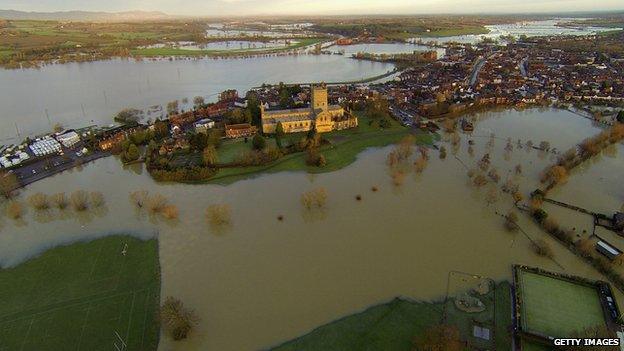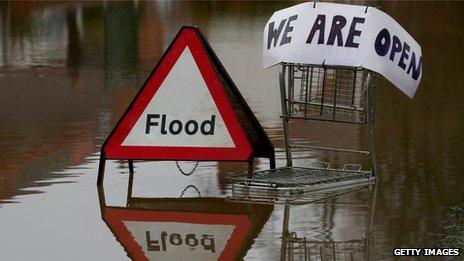Lack of research linking climate change and floods is a 'scandal'
- Published

Flood events in the UK have impacted both coastal areas and towns near rivers like Tewkesbury
Questions about the link between flooding in the UK and climate change could be answered within two years, according to a leading scientist.
Prof Myles Allen from Oxford University said the only thing holding back the work was the lack of investment.
Around £10m a year would provide a real-time attribution system on the role of humans in extreme weather.
He said it was a "scandal" that the public should be denied clarity on this issue.
Scientists are notoriously cautious about linking single weather events, such as the recent storms and flooding in the UK, to rising global temperatures.
Researchers can discern a human fingerprint in extreme weather, external, but it has required huge amounts of computing power to calculate all the possible outcomes.
Definitive answers
Speaking at a news conference in London, Prof Allen said that an investment of around £10m a year would solve that problem.
"You'd actually have definitive answers to these questions as events happen so that we don't end up flapping our hands and saying we're not quite sure. We'd be able to quantify how much human influence on climate has made some events more likely.
"It is a matter of investment from the UK government that we are not able to answer your questions at the moment - and that's a scandal frankly," he said.
Prof Allen explained that his research team had carried out an analysis of the climate change influence, external on the UK floods of 2000. It had taken 10 years.
"We had to rely on computing resources donated by the general public. If these questions matter, it shouldn't be down to university research projects using spare computer capacity donated by the public.
"This needs to be part of what we ask our weather forecasting services to do."
His views were supported by Dr Peter Stott from the UK Met Office who said that the science of attribution was advancing.
"There is a lot of variation in UK rainfall and storminess - can we link it yet [to climate change]? Yes, we have not made an attribution study of the recent events, but we could do that.
"It would be a probabilistic-based conclusion; this would be saying that the risk has increased or not, or maybe decreased as a result of anthropogenic climate change."
A number of British universities are now involved in a European climate and weather attribution initiative, said Dr Stott. The aim would be to provide reliable information on the climate impact on heat waves, cold spells, floods and droughts.

The flood waters are still rising in many parts of England despite a change in the weather
Both Prof Allen and Dr Stott agreed that the Prime Minister was essentially correct when he linked a rise in extreme events to climate change in the House of Commons this week.
Prof Allen said that Mr Cameron had got the balance "about right" in his comments. But the public needed to have clarity on the issue.
"There are also the very substantial sums being spent on decarbonisation. The public is paying that money in the name of doing something about climate change. They deserve to know what climate change is doing to them."
While developing an attribution system wouldn't "save any lives", it would improve our understanding of weather and would help ensure that decisions about future flood defences were more accurately made.
The question of resources in this area was put in the spotlight recently when the chief executive of the Environment Agency told a magazine that government cuts would impact, external mapping and modelling.
Follow Matt on Twitter @mattmcgrathbbc.
- Published8 January 2014
- Published10 January 2014
- Published4 March 2013